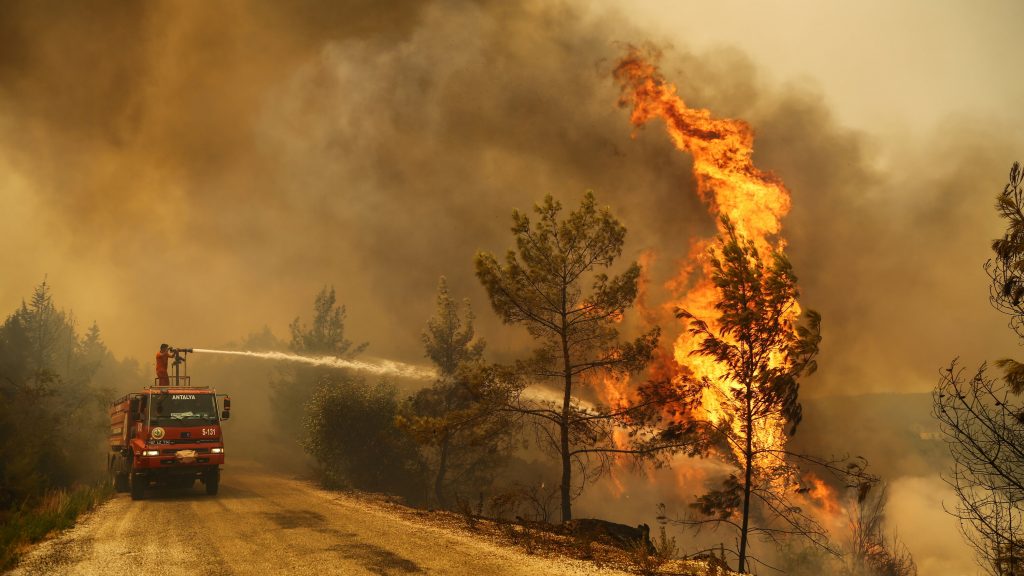
Over a hundred wildfires erupted in Turkey’s Mediterranean Region woods in July 2021, the deadliest in the country’s history. On July 28, 2021, the flames began at Manavgat, Antalya, with 37 °C (99 °F) temperatures. A total of 17 provinces, including Mugla, Adana, Osmaniye, Mersin, and Kayseri, were impacted by simultaneous wildfires as of July 30, 2021. Hundreds of homes, offices, vehicles; thousands of livestock, and; more than 150 hectares of farm fields were destroyed due to the wildfire. It’s reported that up until Saturday (31/7) there were 6 fatalities, more than 300 injured, and thousands seeking refuge (TRT Haber, 2021).
A wildfire is an uncontrolled fire that can burn forest, grasslands, savannas, and other ecosystems. This phenomenon can start due to natural occurrences such as lightning strikes, or due to human’s fault. However, weather conditions often are the biggest determinant of how much a wildfire can grow. Wind, high temperatures, and little rainfall can leave trees, shrubs, fallen leaves, and limbs dried out and primed to fuel a fire (National Geographic, 2019).
This might be why, according to Hikmet Özturk, a forestry specialist with the Turkish Foundation for Combating Soil Erosion, the impacts of climate change on wildfires are making their spread worse. Currently, the wildfire has burned not only Turkey, but also Greece and Italy.
In Addition to the environmental and material losses that a wildfire definitely causes, the air pollution that results from wildfires can cause various health concerns, including respiratory and cardiovascular difficulties. Wildfires also have a substantial impact on mental health and psychological well-being. It poses a greater risk to some group of people than it does to others, including (CDC):
- Children under the age of 18
- Adults above the age of 65
- Pregnant women
- People suffering with chronic illnesses such as heart disease, lung disease, asthma, and diabetes
- Employees that work outdoor
- Individuals of lower socioeconomic level, such as those who are homeless or who have limited access to medical care
- Immunocompromised individuals
There are several things that you can do to battle wildfires. If you’re suffering from the wildfire smoke, make sure that you keep your lungs healthy by avoiding the environmental irritants. Please do note that cloth or surgical masks aren’t suitable to protect us from said smoke. Instead, please choose N95 and KN95 masks to provide you protection against the wildfire smoke (BCCDC, 2021)
If you’re not directly suffering from wildfires but still want to help, don’t be discouraged. Here are some things that you can do to help our beloved-earth:
- Promote your own sustainable movement
- Implement zero-waste lifestyle
- Be an advocate
- Campaign for raising awareness
- Spend the money for donating
Last but not least, us, Standing Committee on Human Rights and Peace – Center for Indonesian Medical Students’ Activities (SCORP-CIMSA), together with Perhimpunan Pelajar Indonesia Turki (Indonesian Student Association in Turkey) invite you to get involved and help to return the smile and hope of our brothers and sisters in Turkey through our fundraising program: GALAKSI TAB – Turkish Wildfire. The donation is open until Wednesday, August 18, 2021. Further information is available on https://bebaskanturkidariapi.carrd.co.
Let’s extend our hand to help those who are in need. Every help counts; little by little, a little becomes a lot.
References
British Columbia Centre for Disease Control. (2021). Face Mask for Wildfire Smoke. Available at: http://www.bccdc.ca/resource-gallery/Documents/Guidelines%20and%20Forms/Guidelines%20and%20Manuals/Health-Environment/BCCDC_WildFire_FactSheet_FaceMasks.pdf
Center for Disease Control and Prevention. (n.d.). Wildfires. Retrieved from website: https://www.cdc.gov/disasters/wildfires/index.html
National Geographic. (2019). Wildfires. Retrieved from website: https://www.nationalgeographic.org/encyclopedia/wildfires/
TRT Haber. (2021). Türkiye’nin ‘ciğerleri’ yanıyor: 7 ilde 20 noktada orman yangını. Retrieved from website: https://www.trthaber.com/haber/gundem/turkiyenin-cigerleri-yaniyor-7-ilde-20-noktada-orman-yangini-598435.html
CIMSliography
Aufa Fathya – CIMSA’s Humanitarian Response Team
